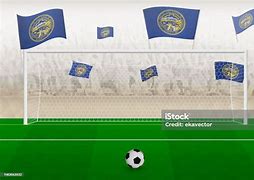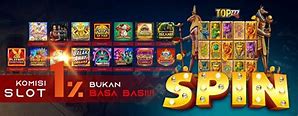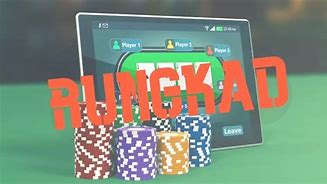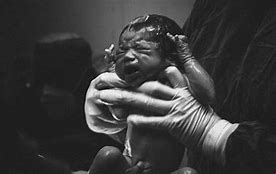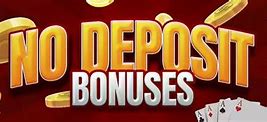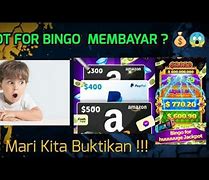
Memanggil semua pengoles! Mencari game bingo GRATIS yang paling menyenangkan? Big Spin Bingo menawarkan berbagai macam ruang bingo, banyak mania BIG SPIN, dan bahkan lebih banyak lagi kegilaan GRATIS! Keberuntungan menanti saat kamu memutar roda bingo di Big Spin Bingo! B-9, O-62, I-28...BINGO! Terobos lebih dari 20 ruang bingo dan hancurkan pengoles bingo pribadi Anda sebelum memanggil BINGO! Hadapi pesaing dari seluruh dunia dalam pertarungan Bingo LIVE sebelum pamer ke teman-temanmu dari puncak papan peringkat! Unduh Big Spin Bingo dan mainkan semua game bingo gratis favoritmu kapan saja, di mana saja! Mengapa Big Spin Bingo?üî• Pilih dari 20+ ruang bingo. Blitz CLASSIC Bingo atau coba Bingo Liburan dan Bingo Festival dengan ruang BARU menarik yang ditambahkan secara berkalaüî• Mainkan hingga 4 KARTU BINGO sekaligus! üî• Kalahkan GAME LIVE melawan pemain di seluruh duniaüî• Dapatkan BONUS ENERGI harian agar kamu tetap bermain secara GRATISüî• Kumpulkan 9 POWER-UP berbeda untuk meningkatkan gameplay-mu üî• Gunakan dauber YANG DISESUAIKAN untuk menyorot semua nomor yang telah dipanggil atau mengingatkan Anda saat Anda memiliki BINGO!üî• Selesaikan teka-teki koleksi untuk menerima energi, koin, atau peningkatan kekuatan yang besar!üî• BERMAIN dengan teman atau BERSAING di papan peringkat!üî• Hubungkan ke Facebook atau undang teman untuk BONUS KREDITBINGO KLASIKDapatkan sensasi bingo GRATIS yang beruntung dengan bermain bingo KLASIK! Ngobrol dengan teman dan lawan atau mainkan hingga 4 kartu sekaligus untuk meningkatkan peluangmu!LIBURAN BINGOMainkan multi-bingo di seluruh dunia dan nikmati pengalaman budaya yang berbeda di setiap ruangan! Setiap lokasi yang jauh dan eksotis berisi tantangan berbeda untuk membantumu membuka dan menjelajahi tujuan baru. Kemasi daub Anda untuk tempat-tempat seperti Hawaii, Roma, Venesia, Bangkok, Hong Kong, Rio, Mesir, New York, Las Vegas, dan banyak lagi‚Ķ BINGO FESTIVAL Jadilah turis yang mengunjungi festival di seluruh dunia dengan bermain Festival Bingo. Basahi diri Anda dengan tomat di 'La Tomatina' di Spanyol, rayakan Tahun Baru Imlek di Festival 'Lantern' atau rayakan 'Hari St Patrick bersama orang Irlandia. Dengan 15+ tema festival dan tema baru yang ditambahkan secara berkala, selalu ada sesuatu untuk semua orang yang bermain Festival Bingo.POWER UP BINGOBerikan TWIST yang menyenangkan pada bingo klasik dengan POWER BINGO. Gunakan power-up untuk menambahkan sesuatu yang ekstra ke permainanmu - seperti poin bonus ekstra dan kemenangan GANDA! HIGH ROLLERIni berisiko tinggi dan bahkan lebih tinggi imbalannya! Nikmati keseruan dan sensasi menang BESAR saat kamu melipatgandakan permainanmu 1x, 3x, 5x, 8x, dan 10x di ruang High Roller Bingo kami. BINGO NATALBubuhkan angka untuk membantu Sinterklas mengumpulkan hadiah Natal untuk karungnya. Temukan 5 hadiah tersembunyi dan Bingo Natalnya!Ikuti Big Spin Bingo di SosialSukai kami di facebook.com/bigspinbingo untuk kesempatan memenangkan energi, koin, dan power up GRATIS setiap minggu! Game ini hanya untuk tujuan hiburan.Big Spin Bingo ditujukan untuk pemain berusia 21+ untuk tujuan hiburan saja dan tidak menawarkan ‚Äúperjudian dengan uang sungguhan‚Äù atau peluang apa pun untuk memenangkan uang sungguhan melalui permainan. Memainkan Big Spin Bingo tidak berarti kesuksesan di masa depan dalam ‚Äúpermainan dengan uang sungguhan‚Äù.Jangan jual data saya: Big Spin Bingo membagikan informasi pribadi Anda dengan mitra periklanan untuk mempersonalisasi iklan. Pelajari lebih lanjut di https://www.bigspinbingo.com/privacy-policy/. Jika kamu ingin menggunakan hak Jangan Jual Dataku, kamu dapat melakukannya dengan menghubungi kami melalui pusat bantuan dalam game atau dengan mengirim email ke [email protected]
From Wikipedia, the free encyclopedia
in Wiktionary, the free dictionary.
Bingo or B-I-N-G-O may refer to:
It’s Free! It’s Social! It’s Online Bingo!
Bingo Blitz features a bingo experience like no other. Become a part of our online Bingo Blitz Global Community today to join the party! Travel the world with over 1 million players, and new friends from across the globe! Bingo Blitz is all about collaboration. You can join Teams, trade Items together, and chat with one another in any Bingo Room you play! With Bingo Blitz, you can let your social butterfly spread its wings!
It was an evening in December of 1929 when a very tired New York toy salesman, Edwin S. Lowe, decided to drive on to Jacksonville, Georgia so that he might have an early start for his next day's appointments. The year before, with two employees and $1,000 capital, Lowe had set up his own toy company. Soon after, the market crashed, and the outlook for his budding firm looked bleak indeed
A few miles from Jacksonville, Lowe came around a bend in the road and was greeted by the bright lights of a country carnival. He was ahead of schedule, so he parked his car and got out. All of the carnival booths were closed except one, which was packed with people. Lowe stood on tiptoes and peered over the shoulders of the participants. The action centered on a horseshoe-shaped table covered with numbered cards and beans. The game being played was a variation of Lotto called Beano. The pitchman, or caller, pulled small numbered wooden disks from an old cigar box and, at the same time, called the number aloud. The players responded by eagerly checking their card to see if they had the number called; if so, they would place a bean on the number.
This sequence continued until some someone filled a line of numbers on their card - either horizontally, vertically or diagonally. This feat was marked by the shout of "Beano!" The winner received a small Kewpie doll.
Ed Lowe tried to play Beano that night, but he recalls, “I couldn’t get a seat But while I was waiting around, I noticed that the players were practically addicted to the game. The pitchman wanted to close up, but every time he said, 'This is the last game,' nobody moved. When he finally closed at 3:00 a.m. he had to chase them out."
After locking up, the pitchman told Lowe that he had run across a game called Lotto while traveling with a carnival in Germany the previous year. His immediate thought was that it would make a good tent or carnival game. He made a few changes in its play and a change of the name to Beano. The game proved to be such a surefire crowd pleaser and moneymaker that on his return to the United States, he continued to work the game on the Carnival circuit
What’s a game that’s easy to play? Loved by everyone? And popularized by a struggling NYC toy salesman? If you said “Bingo”…BINGO! What you probably didn’t know about this fun-to-play classic is that it owes its existence to a bag of beans and a good old dose of everyday magic.
Our brief Bingo lesson starts in 1530s Italy, where Bingo’s precursor, a game called Lo Giuoco del Lotto D’Italia—a weekly lottery that’s still played today—has taken the country by storm. By the 1770’s, the game has made its way to France where it takes on the abbreviated name, Le Lotto. By the 1800’s it’s being played in Germany, which gave us the root word for “lotto”: Lot, meaning “fate”, and hinting at the random chance of winning. By 1929, the game finally reaches North America, where the modern story begins.
That fateful year is where our bag of beans enters the picture. With America headed into the the Great Depression, a down-on-his-luck toy salesman, Edwin S. Lowe, stumbled upon a carnival game that would change his life forever. The game, a derivative of the old European Lotto, was called Beano. Players were given a card with a series of numbers on it, along with a bag of beans to use as play markers. A caller would pull numbered slips from an old cigar box, and when someone scored enough beans to make a line they’d yell “BEANO!” before collecting their prize. Sound familiar?
Taken with the game, Mr. Lowe brought the beans back to his home of New York City, where they’d have their magic moment. One night, Lowe gathered some friends to try out his newfound game. Libations flowed. As the evening progressed, the group fell deeper and deeper under the spell of the lively, easy-to-play game. Then, during a heated round of play, one of the guests scored a big win. Bursting with excitement, she accidentally yelled “B-B-B-BINGO!” instead of “BEANO!”, and the planets aligned. Bingo was born!
The toy salesman knew instantly that he had a hit on his hands. “I cannot describe the strange sense of elation which that girl’s cry brought to me,” Lowe said. “All I could think of was that I was going to come out with this game, and it was going to be called Bingo!1”
In an effort to build out the game and reduce duplicate wins, Lowe hired Carl Leffler, a math professor from Columbia University, to increase the number of bingo card combinations. As the game grew in demand, and Lowe’s need for unique cards increased, so too did the difficulty of figuring out additional combinations. Ultimately, Lowe found himself paying the professor $100 per card, roughly $1,548 in today’s money, a veritable fortune.
Today, Edwin S. Lowe and his bag of beans are long gone. The pure adrenalin-filled excitement of a Bingo win however, not only lives on but has grown in popularity. Around the world, crowds assemble in Bingo Halls and Charitable Gaming Centers hosted by energetic callers who shout out ball numbers and letters.
From its storied past, to ubiquitous present, the popularity of Bingo remains as strong as ever. And to think, we owe it all to a simple bag of beans. Let’s take a look at a few modern magical milestones in the history of this glorious game.
Ready for a little Bingo in your life?
Learn all about this fun-to-play classic now.
1Source: “Gambling Times Guide to Bingo” by Roger Snowden Reprinted by permission of Roger Snowden © 1986 Gambling Times Incorporated
Other arts and entertainment
Topics referred to by the same term
Nikmati game bingo online Anda dengan gameplay luar biasa yang belum pernah Anda alami sebelumnya, sambil mengalami perjalanan game bingo, di Bingo Riches!Jangan ragu! Mainkan Bingo Riches sekarang dan mulailah kisah permainan bingo gratis yang menarik untuk dimainkan.üåàBermain beberapa kartu: Satu kartu TERLALU membosankan, kami mendukung pemain yang rajin untuk menantang gameplay multi-kartu pada saat yang sama!üåàGrab Powerups: Pemain dapat menggunakan powerups untuk kemenangan bingo yang lebih banyak lagi!üåàMengumpulkan barang: Bagaimana cara berkeliling dunia tanpa oleh-oleh? Raih item di setiap kota yang Anda kunjungi untuk memenangkan hadiah besar!Bingo Riches adalah permainan bingo gratis yang dipadukan dengan permainan papan klasiküé≤. Ikuti tur di Bingo Riches bersama teman dan keluarga Anda untuk menikmati pengembaraan ke tempat-tempat menarik di seluruh duniaüó∫Ô∏è.Klaim banyak Tiket gratis üé´ dan Power-up setiap hari!Berikut adalah beberapa saran berguna untuk mengumpulkan tiket.üé´Tingkatkan bangunan Andaüöß (khususnya Ticket Center, Casinoüé∞, Wishing Wellüßû‚Äç‚ôÇÔ∏è, Diamond Shopüíé...) dan rampok kota orang lain.üé´Dapatkan Hadiah Gratis Harian di Klub Anda.üé´Kumpulkan Bonus Harian, mainkan Spinner setiap tiga jam gratis.üé´ Hancurkan PIGGY BANKüê∑ dan tingkatkan tabungan Anda.üé´Mainkan di kamar berbiaya rendah, selesaikan Daily QuestsüéØ dan Challenges‚õ≥.üé´Dapatkan hadiah untuk menaikkan level Quest Pass dan menyelesaikan Prestasi.üé´Kami mengirimkan tiket di halaman penggemar Facebook kami dari waktu ke waktu.üé´Sistem mengirimkan hadiah gratis beberapa kali sehari.Bingo Riches adalah cara yang baik untuk bersantai dan menghilangkan stres Anda dari tekanan kehidupan sehari-hari.Anda dapat bermain dengan keluarga, teman, dan ribuan pemain di seluruh dunia; Ini juga merupakan cara bersosialisasi yang baik untuk memainkan permainan kami!Hubungi kami: Beri tahu kami tentang memainkan Game Bingo Gratis!Kami akan senang mendengar dari Anda, di manapun Anda berada di dunia!Anda dapat menghubungi kami diüéÅ https://www.facebook.com/playbingoriches/üéÅ.Bingo Riches ditujukan untuk mereka yang berusia 21 tahun ke atas hanya untuk tujuan hiburan dan tidak menawarkan perjudian 'uang nyata', atau kesempatan untuk memenangkan uang nyata atau hadiah nyata berdasarkan permainan game.Bermain atau sukses dalam game ini tidak menyiratkan kesuksesan di masa depan dalam perjudian ‚Äòuang sungguhan‚Äô.Bingo Riches tidak memerlukan pembayaran untuk mengunduh dan bermain, tetapi juga memungkinkan Anda membeli barang virtual dengan uang sungguhan di dalam gim.Anda dapat menonaktifkan pembelian dalam aplikasi di pengaturan perangkat Anda. Bingo Riches juga dapat berisi iklan. Anda mungkin memerlukan koneksi internet untuk memainkan Bingo Riches dan mengakses fitur sosialnya.Anda juga dapat menemukan informasi lebih lanjut tentang fungsionalitas, kompatibilitas, dan interoperabilitas Bingo Riches dalam deskripsi di atas dan informasi app store tambahan.Dengan mengunduh game ini, Anda menyetujui pembaruan game di masa mendatang seperti yang dirilis di app store atau jejaring sosial Anda.Anda dapat memilih untuk memperbarui game ini, tetapi jika Anda tidak memperbaruinya, pengalaman dan fungsionalitas game Anda mungkin berkurang.
American game of chance
In the United States and Canada, bingo is a game of chance in which each player matches the numbers printed in different arrangements on cards. The game host (known as a caller) draws balls at random, marking the selected numbers with tiles. When a player finds that the selected numbers are arranged on their card in a horizontal, vertical, or diagonal line, they call out "Bingo!" to alert all participants to a winning card, which prompts the game host (or an associate assisting the host) to examine the card for verification of the win. Players compete against one another to be the first to have a winning arrangement for the prize or jackpot. After a winner is declared, the players clear their number cards of the tiles and the game host begins a new round of play.
Alternative methods of play try to increase participation by creating excitement. Since its invention in 1929, modern bingo has evolved into multiple variations, with each jurisdiction's gambling laws regulating how the game is played. There are also nearly unlimited patterns that may be specified for play. Some games require only one number to be matched, while cover-all games award the jackpot for covering an entire card. There are even games that award prizes to players for matching no numbers or achieving no pattern.
A game of chance named lotto was being played in Italy by about 1530. In the 18th century, a home version (called Tombola) was created in Naples with the addition of cards, tokens, and the calling out of numbers. In the nineteenth century, a game like this was widely played in Germany to teach children spelling, animal names, and multiplication tables.
The French game Le Lotto appeared in 1778, featuring 27 squares in a layout of three rows and nine columns. Five squares in each row had numbers ranging from 1 through 90, which led to the modern design.[1]
In the early 1920s, Hugh J. Ward created and standardized the game at carnivals in and around Pittsburgh and the Western Pennsylvania area. He copyrighted it and published a rule book in 1933.[2]
The game was further popularized by Edwin Lowe. While at a traveling carnival near Atlanta in December 1929, the toy merchandiser saw people eagerly playing a game called "Beano", following Ward's rules, with dried beans, a rubber stamp, and cardboard sheets. Lowe took the game to New York, where friends liked playing it. The Lowe-produced bingo game had two versions: a 12-card set for $1.00 and a $2.00 set with 24 cards. By the 1940s, there were bingo games throughout the US.
The origin of the name Bingo is unknown but may date to the mid-1920s. There are claims that one of Lowe's friends[3] was so excited to have won that she yelled out "Bingo" instead of "Beano", or that the word echoes the sound of a bell.
The most common bingo cards are flat pieces of cardboard or disposable paper that contain 25 squares arranged in five vertical columns and five side-to-side rows. Each space in the grid contains a number, except the middle square, which is designated a "free" space.
A typical bingo game utilizes the numbers 1 through 75. The five columns of the card are labeled 'B', 'I', 'N', 'G', and 'O' from left to right. The center space is usually marked "free" or "free space", and is considered automatically filled.[4] The range of printed numbers that can appear on the card is normally restricted by column, with the 'B' column only containing numbers between 1 and 15 inclusive, the 'I' column containing only 16 through 30, 'N' containing 31 through 45, 'G' containing 46 through 60, and 'O' containing 61 through 75.
The number of all possible bingo cards with these standard features is P(15, 5) × P(15, 5) × P(15, 5) × P(15, 5) × P(15, 4) = 552,446,474,061,128,648,601,600,000 or approximately 5.52×1026. Interestingly, the way the numbers are being assigned to each column makes a horizontal line win about three times more probable than a vertical line win when many people play together.[5]
In u-pick 'em bingo and other variants of bingo, players are issued three 25-number cards that contain all 75 numbers that may be drawn. Players then mark which numbers they wish to play and then daub those numbers according to the numbers drawn. In addition, double-action cards have two numbers in each square.
A player wins by completing a row, column, or diagonal. The most chips one can place on a bingo board without having a bingo is 19, not counting the free space. (For this to happen, two spots in opposite corners must not be filled along with a spot on one corner of the center away from the two opposite corner spots and finally opposite to that in relation to the center would be two flat against the center piece.)
In addition to a straight line, other patterns may be considered a valid bingo in special games. For example, a 2×2 square of marked squares in the upper-right-hand corner could be considered a "postage stamp". Another commonly valid pattern is covering the four corners. Certain special games only count specific patterns as bingos, such as a roving 'L', which requires players to cover all B's and the top or bottom row or all O's and the top or bottom row, or a blackout, covering all 24 numbers and the free space.
The numbers that are called in a game of bingo may be drawn utilizing a variety of methods to randomly generate the ball call. With the expansion of computer technology in bingo, electronic random number generators (RNG) are now commonplace in most jurisdictions. Some require mechanical ball draws which may utilize a randomly shuffled deck of bingo calling cards, a mechanical ball blower that mixes ping pong balls with blown air, or a cage that is turned to mix small wooden balls. All methods essentially generate a random string of numbers that players match to the bingo cards that have numbers on them.
Single games often have multiple bingos; for example, the players first play for a single line; after that, play goes on until a full card is called; then, play continues for a consolation full card.
Players often play multiple cards for each game. Because of the large number of cards played by each player, most halls have the players sit at tables to which they often fasten their cards with adhesive tape. To mark cards faster the players usually use special markers called daubers. At commercial halls, after calling the number the caller then displays the next number on a television monitor; bingo cannot be called until that number is called aloud.
Bingo is often used as an instructional tool in American schools and in teaching English as a foreign language in many countries. Typically, the numbers are replaced with beginning reader words, pictures, or unsolved math problems. Custom bingo creation programs now allow teachers and parents to create bingo cards using their own content.
In the United States, bingo games are commonly organized by churches or charity organizations,[7][8] with their legality and stakes varying by state regulation. Bingo halls in some states are rented out to sponsoring organizations, and these halls often host games almost daily. Church-run games, on the other hand, are typically weekly events held on church premises. These games are usually played for modest stakes, although the final game of a session often features a coverall game with a larger jackpot prize for winning within a certain quantity of numbers called. A progressive jackpot is one that may increase per session until it is won.
Commercial bingo games in the US are primarily offered by casinos (only in the state of Nevada) and Native American bingo halls, which are often located in the same venue as Native American-run casinos.[citation needed] In Nevada, bingo is mainly offered by casinos catering to local gamblers, rather than the famous tourist resorts. They typically offer one-hour sessions on the odd hours, such as 9 am, 11 am, and 1 pm daily, usually from 9 am to 11 pm, with relatively modest stakes except for coverall jackpots. Most bingo parlors in Las Vegas use handheld machines for the games.
Native American games usually offer only one or two sessions a day and are often played for higher stakes than charity games to attract players from distant places. Some also offer a special progressive jackpot game that may link players from multiple bingo halls.
In both Canada and the United States, some gay bars and other LGBT-oriented organizations host bingo events, often combined with a drag show and marketed as "Drag Bingo" or "Drag Queen Bingo".[9] "Drag Bingo" events originated in Seattle in the early 1990s as a fundraiser for local HIV/AIDS charities.[9] They have since expanded to many other cities across North America, supporting a diverse range of charities.[9]
Cheektowaga, New York, with one bingo hall for every 6,800 residents, is believed to have the highest concentration of bingo halls in the United States. The suburb of Buffalo's large Polish-American Catholic population is thought to be a factor in bingo's significant popularity in Western New York, which has five times as many bingo halls per capita as the rest of the state.[10]
The advent of computer technology in bingo has blurred the lines between traditional slot machines and bingo slot machines. To the average person, bingo-based slot machines are physically indistinguishable from an RNG based slot machine typically seen in Atlantic City or Las Vegas. These devices are commonly called Class II machines, because the federal Indian Gaming Regulatory Act separated bingo, including electronic and mechanical aids, where players play against each other, from Class III slot machines, where players play against the house.[11]
As a result of the passage of SB1180 in 2017, the State of Arizona now allows technological aids for bingo games that function only as an electronic substitute for bingo cards. These technological aids are not defined by Arizona law or regulation, but one such electronic technological aid consists of a system which includes a network linking player interfaces to a number drawing device (ball-draw server) and an electronic substitute for a "live" cashier. The player interfaces themselves do not contain random number generators or allow a player to directly deposit cash. Rather, the Arizona technological aid system allows a player to deposit money into a unique individual player's account, pay for the games played out of that account, and at the end of play redeposit the value of any unused games that the player may have purchased or won back into that account. The system does not allow the player to print a redemption ticket or receive anything of value directly from the player interface.
Music bingo is growing in popularity and is finding its way into bars, pubs, and other events as bingo is already a familiar concept and when integrated with music, also results in fun and collaboration among players (singing along to the songs that are randomly played). It was introduced as a game show in 1958[12] and continues to expand today.[13]







